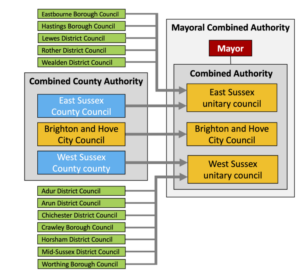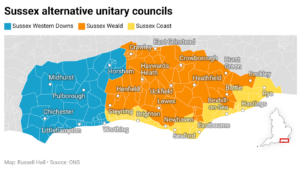East Sussex County council leaders are requesting May’s local elections be suspended, as part of a bid to become one of the first places to go through a major reorganisation process.
On Thursday, January 9, the ESCC cabinet agreed to write to the government and express the council’s commitment to aid in the creation of the new unitary and mayoral authorities, set out in a recent policy announcement.
This will involve applying to join the government’s Devolution Priority Programme — a scheme intended to fast track the establishment of mayoral authorities. Locally, this is expected to see a new mayor, who would represent the entirety of Sussex, take on devolved powers from central government.
In a connected process, the council also committed to be involved in developing a proposal for unitary council in East Sussex.

Alongside this, cabinet members also agreed to ‘invite’ the government to postpone the county council elections due to take place in May this year — a move critics characterised as an outright ‘cancellation’.
Conservative council leader Keith Glazier defended the request, arguing the authority would not have the staffing and resources to both run elections and do the work necessary to be part of the first wave of councils to transition to the new system — a position he argued would result in the best outcome for the county.
He said: “The people of East Sussex deserve the best that is on offer. Whether we like it or not, the political mandate was given to the current government in July of last year and they have set out their way of dealing and they are very clear that this will happen before the end of this term.
“The bottom line is that we can be in there shaping it or we can be falling behind.”
He added: “A question we will be asked if we get on to the [Devolution Priority] Programme is are we confident that with the staff and the officer [available] to us that we can deliver what we are saying by May 2026 and 2027.
“The answer to that, without suspending elections, is I couldn’t [be confident].”
The council’s opposition parties took a different view, with Labour, Liberal Democrat and Greens all arguing the elections should go ahead. These arguments were made plain during an extraordinary full council meeting, which took place immediately before the cabinet meeting.
During this meeting, which the LDRS understands was called by the authority’s Green Party group, councillors debated a motion calling on the council to publicly state a view that May’s elections should go ahead.
Speaking in favour of the motion, Green Party councillor Wendy Maples said: “Whether we think the changes proposed by government are more opportunity or more threat, they are change and change gives, or should give residents the opportunity to reflect anew on what they want.
“Denying residents a vote is a very serious decision. It says ‘I know better’. I have been in this role for three-and-a-half years and what I can say is that you don’t. You don’t know better, our residents do.”
Cllr Maples went on to accuse the minority Conservative administration of seeking to hold on to political power until the county council’s abolition — a process which could last at least three years. This is because the new unitary authority, expected to hold elections in 2027 at the earliest, is considered likely to spend a year ‘shadowing’ the existing council structure before taking on its full responsibilities.
Liberal Democrat Kathryn Field shared a similar view. She said: “We have elections scheduled for May. We are elected for four years; the public knows that and the public knows that they have a right, every four years, to express their view on what is being done on their behalf by their councillors.
“I accept that we have to go ahead [with the reorganisation], but we should give the public the right to have their say on what we are going to be doing, because we are doing it for them on their behalf.”
Similar arguments were made by other opposition groups, with Labour councillors including Chris Collier and Christine Robinson stressing how the suspension of elections was not a mandatory element of the government’s Devolution Priority Programme.
However, the motion was voted down with the council’s three Independent members — Charles Clark and former Conservatives Abul Azad and Sam Adeniji — voting alongside the Conservative group to defeat the proposal 23 votes to 21.

During the wider debate, several opposition councillors took aim at the government, with some arguing that the reorganisation was happening too quickly and would result in an ineffective system of local government.
Liberal Democrat Stephen Holt was among those to make this argument. He said: “It is disturbing that any authority is expected to respond to government proposals that were published just before Christmas 10 days into the new year.
“With the financial struggles of this authority replicated across the country in many other authorities, tackling the financial deficit whilst protecting services should be the priority.”
He added: “In short, this is a rushed process forced upon us by national government and as a result has had little consultation with residents and key stakeholders. This is wrong.”
This view was disputed by Labour’s Godfrey Daniel, who argued a unitary authority would serve residents better than the current two-tier system.
Cllr Daniel said: “I think there is a strong case for a unitary authority personally. I know that will upset people who have seats on boroughs and districts, but as far as the people out there are concerned, they don’t really worry about structure, they worry about services.
“When somebody tells me they’ve got a drain blocked and I have to ask them ‘is it blocked at the top with leaves in which case the borough council has to clean it, or is it blocked underneath in which case it is the county council’s [responsibility].’”
Cllr Daniel also opened debate around what a new unitary authority should look like, joining with others to argue in favour of a “coastal strip” rather than a unitary council which follows the county council’s current boundaries.
Some councillors — like Cllr Daniel — argued this would better reflect the character of the area. But others argued this may be unfeasible, particularly given the short time frame councils have to come up with proposals and the stipulations set out by the government.
After lengthy debate across both meetings, Conservative cabinet members agreed to write to the government on all three measures.
This includes bidding to be part of the government’s Devolution Priority Programme on the basis of creating a new mayoral combined authority for the Sussex area. This proposal also saw support from West Sussex County Council and Brighton and Hove Council during similar meetings held the same day.
Image Credits: KT Bruce , Russell Hall .



